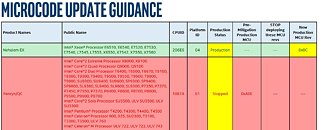
Next-Gen Intel Core i3 to Sport Hyper Threading?
TUM_APISAK has done of his well-regarded snoopings again, and this one could have relevant information for the democratization of threads in next-gen Intel products. Intel has been slowly (as they can) increasing the amount of cores and threads in their respective product lines across i3, i5, and i7 CPUs after AMD's Ryzen onslaught. Luckily, from two core, four-thread Core i3 of a few years ago, we now seem to be entering a new era for entry-level computing, with a new SiSoftware benchmark seemingly showing an Intel next-gen "Comet Lake" Core i3 CPU sporting 4 physical threads with Hyper Threading enabled (so, basically, the equivalent of Skylake Core i7's from just three years ago).
The benchmark submission lists what appears to be a four-core, eight-thread Core i3-10100. It sports a 3.6 GHz base clock, which likely isn't final, so take that frequency with a grain of salt. This shuffle in the low-end definitely means an upscale in Intel's more powerful lineups, with HyperThreading likely being active for all of their product stack across Comet Lake - 4C, 8T Core i3; 6C, 12T Core i5; 8C, 16T Core i7; and a likely 10C, 20T Core i9 10900K that straddles the line between consumer and HEDT platforms. Of course, remember these are still built upon the 14 nm process, give or take a few "+" symbols, so don't expect too much in terms of energy efficiency gains.
The benchmark submission lists what appears to be a four-core, eight-thread Core i3-10100. It sports a 3.6 GHz base clock, which likely isn't final, so take that frequency with a grain of salt. This shuffle in the low-end definitely means an upscale in Intel's more powerful lineups, with HyperThreading likely being active for all of their product stack across Comet Lake - 4C, 8T Core i3; 6C, 12T Core i5; 8C, 16T Core i7; and a likely 10C, 20T Core i9 10900K that straddles the line between consumer and HEDT platforms. Of course, remember these are still built upon the 14 nm process, give or take a few "+" symbols, so don't expect too much in terms of energy efficiency gains.
















































